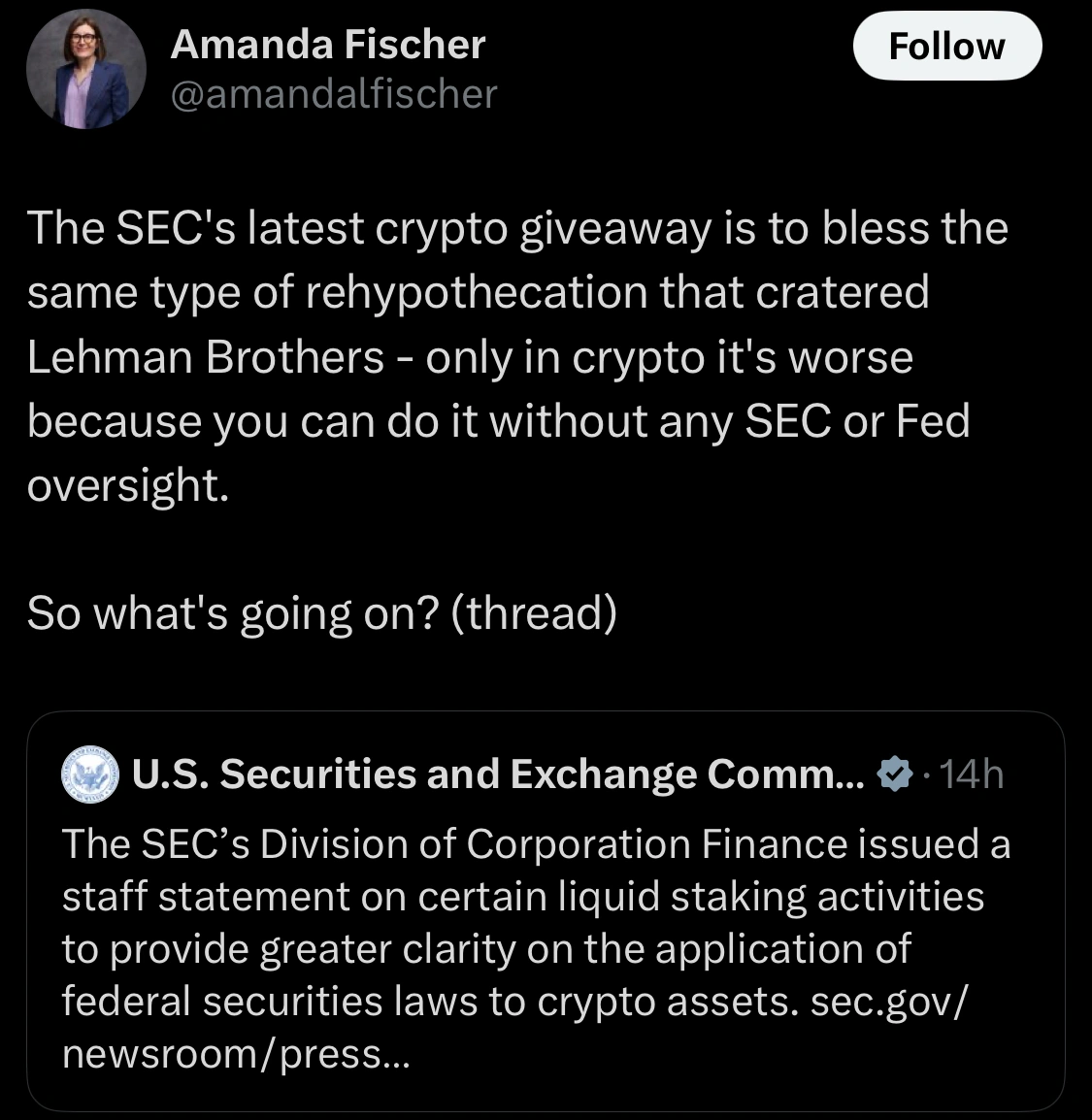Amanda Fischer, former Chief of Staff to SEC Chair Gary Gensler, recently made headlines for criticizing the SEC’s stance on liquid staking, comparing it to the risky rehypothecation practices that led to the Lehman Brothers’ collapse in 2008.
She shared her opinions via a post on her official X page and has since received a lot of backlash from industry leaders and regular crypto natives alike.
 Amanda Fischer joins Caroline Crenshaw in criticizing the Atkins-led SEC’s crypto stance. Source: @amandafischer (X/Twitter).
Amanda Fischer joins Caroline Crenshaw in criticizing the Atkins-led SEC’s crypto stance. Source: @amandafischer (X/Twitter).
Gensler’s former chief of staff weighs in
In her post on X, Fischer argued that liquid staking , which involves staking crypto assets through a protocol and receiving a liquid staking receipt token, encourages the creation of synthetic tokens that can be reused without clear oversight, something she says amplifies the risks due to decentralization.
“It is not dissimilar to Lehman borrowing customers’ assets and using it as collateral to make other bets in the market,” she wrote.
Fischer suggested the SEC effectively giving its blessing for these activities by not classifying them as securities places them outside the agency’s jurisdiction.
She thinks this is risky and highlighted how customers will now rely on the intermediaries that create the synthetic tokens and their ability to manage the staking activity, including in cases where there is huge centralization in a market.
“Also if the synthetic token fails or is hacked, that failure can now cascade wider and deeper through crypto, exacerbating losses,” she wrote. “Assets can also be restaked and restaked and restaked – generating synthetic token upon synthetic token. It begins to look a lot like the leverage on derivatives tied to mortgages.”
The crypto community unloads on Fischer’s argument
Fischer’s comments have triggered significant backlash from members of the crypto industry, with figures like Austin Campbell of Zero Knowledge Consulting arguing that regulators are still using traditional financial lenses to evaluate decentralized systems, where leverage isn’t the primary issue.
“They live in a world that is centralized and intermediated, because that was the only way to do things effectively in the 1970s when these systems were designed,” Campbell said in an interview. “They don’t realize that they think of everything as centralized, so automated systems really throw them.”
As far as Campbell is concerned, the question for regulators is in recognizing “who has control,” and he believes that whoever can control the protocol and the actions has control of the funds.
VanEck’s Matthew Sigel also challenged Fischer’s statements, pointing out an apparent contradiction in her claims.
“First, you say the SEC is blessing crypto. Then you say crypto has no SEC oversight. Which is it? You’re contradicting yourself mid-rant,” Sigel wrote on X.
Legal analyst Kurt Watkins also weighed in, highlighting how the blockchain has technical safeguards, like transparency, that make liquid staking different from traditional rehypothecation.
Mert Mumtaz, CEO of Solana infrastructure firm Helius Labs and a well-known defender of Solana, called Fischer’s comparison “insane work” before concluding that she either has no idea how LSTs work or is “being intentionally obtuse.”
With her polarizing statements, Fischer has become the second person from the Gensler regime to face backlash from the crypto community. Before Fischer, Caroline Crenshaw who has been tagged as Gary Gensler’s proxy in the SEC because of her stance towards crypto, also made critical comments.
Crenshaw distanced the full Commission from this liquid staking interpretation, stating that the guidance holds no binding authority, either presently or in the future.
Most notably, she is one of the relics from Gensler’s era who still believes that the SEC should prosecute crypto at every turn to ensure compliance and user safety. Her stance makes her one of the most polarizing members of the SEC, with growing calls for her exit from the Commission. Crenshaw was sworn in to the SEC in 2020.
KEY Difference Wire helps crypto brands break through and dominate headlines fast
